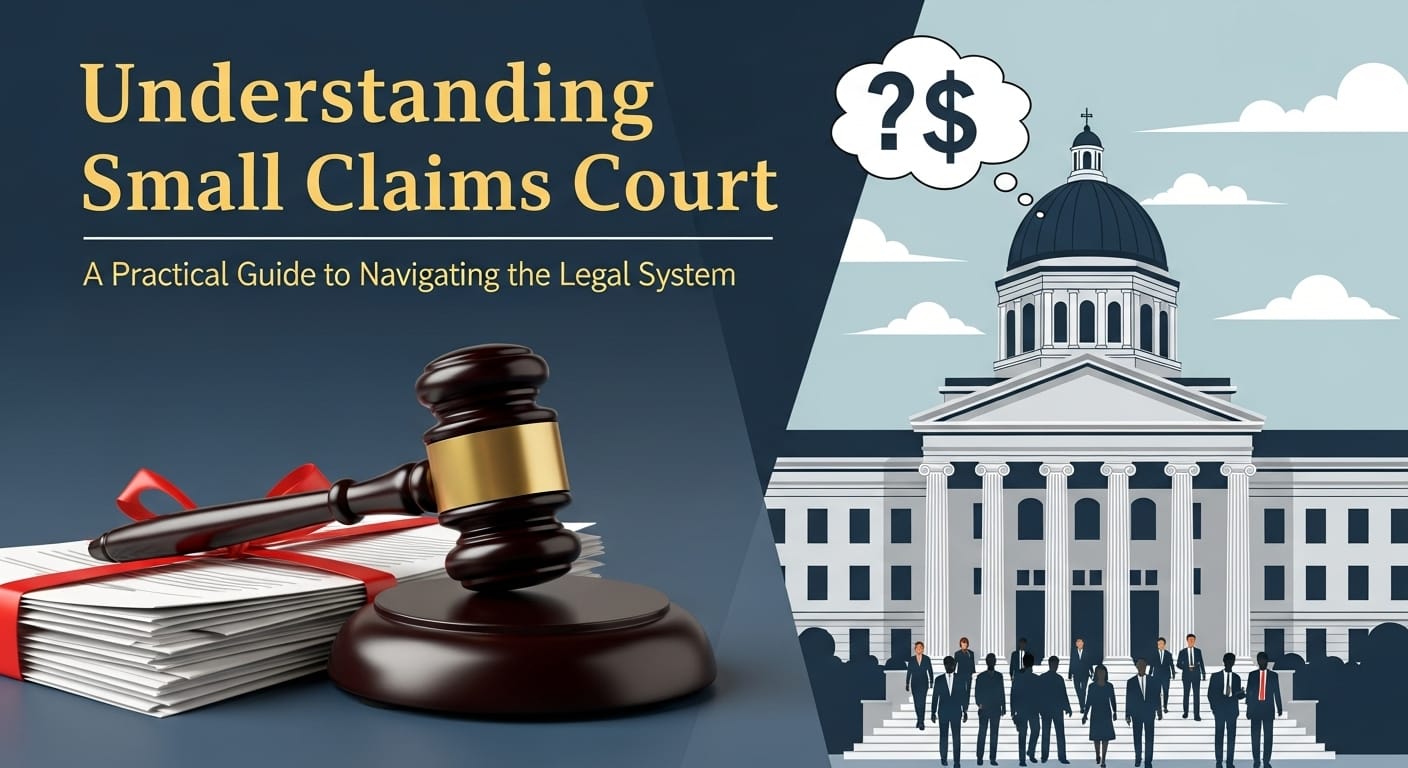So, you’ve got a dispute that’s too big for your neighbor’s backyard barbecue but not quite worthy of a full-blown courtroom drama. Enter small claims court—the legal equivalent of the kiddie pool where you can splash around without needing a lifeguard.
In this guide, we’ll wade through the ins and outs of small claims court so you can navigate it like a pro (or at least like someone who knows which side of the courtroom to sit on).

Top Takeaways and Key Concepts
Confirm your case qualifies by checking your state’s small claims court money limit before filing.
Gather strong evidence like contracts, receipts, photos, and messages to clearly support your story.
File your claim correctly by submitting forms accurately and serving notice to the defendant.
Present your case clearly by practicing your explanation and staying calm and respectful in court.
Plan for collection after judgment because winning doesn’t guarantee payment without follow-up action.
Summary of This Article
This article explains how small claims court works and why it’s a useful option for resolving minor legal disputes without hiring an attorney. It covers common case types such as unpaid debts, property damage, contract disputes, and security deposit issues. The article outlines the financial limits for filing, which vary by state, and emphasizes the importance of preparation—gathering documents, organizing evidence, and practicing your statement. It also explains the process of filing a claim, serving notice to the other party, and what to expect in the courtroom on hearing day. Finally, it reminds readers that even if they win, they may need to take extra steps to collect the judgment.
What Is Small Claims Court?

Let’s kick things off with the basics: what exactly is small claims court? Well, imagine if regular court was a fancy restaurant with white tablecloths and snooty waiters; small claims court is more like your favorite diner where everyone knows your name—and your business.
Small claims courts are designed to resolve disputes involving relatively small amounts of money—typically ranging from $2,500 to $10,000, depending on where you live. It’s meant to be quicker and less formal than traditional court proceedings.
You don’t need an attorney (though having one could make things easier), and the rules are generally simpler. It’s like ordering off the kid’s menu: straightforward and no hidden surprises!
Common Reasons People Use Small Claims Court
You might be wondering why people even bother with this whole small claims thing in the first place. There are plenty of reasons! Here are some common scenarios:
– Unpaid Debts: Did your buddy borrow twenty bucks for pizza and then mysteriously forget about it? You’re not alone! Many folks head to small claims to recoup unpaid loans or services.
– Security Deposits: If you’ve ever rented an apartment, you know how hard it can be to get that security deposit back. Sometimes landlords play games—like they think your old carpet is worth gold!
– Breach of Contract: Maybe someone didn’t deliver on their end of a deal—a contractor flaked out or a vendor delivered half-baked goods (literally). Small claims court gives you a chance to seek compensation.
– Property Damage: Whether it’s that unfortunate incident when your neighbor’s tree fell on your car or someone accidentally dented your prized collection of vintage lunchboxes, you can seek reparations here.
How Much Can You Sue For?
Now let’s talk money—specifically how much you can actually sue for in small claims court. This varies by state but usually caps at anywhere from $2,500 up to $10,000.
Yes, I know what you’re thinking: “Why isn’t it higher?” But remember, this isn’t Wall Street; it’s more about resolving issues efficiently rather than throwing cash around like confetti.
Interestingly enough, if you feel particularly feisty—or maybe just really passionate about getting back every last penny—you might consider splitting larger amounts into separate smaller claims.
Just keep in mind that judges aren’t fans of “gaming” the system! They want genuine cases—not attempts at legal gymnastics.
Preparing Your Case
Alrighty then! You’ve decided that taking action is worth it; now what? Preparation is key! First off, gather all relevant documents—contracts, receipts, photos (yes those embarrassing ones count!), and any written communication related to your case.
Think of this as putting together evidence for an Oscar-winning documentary—every little detail matters!
Next up: practice telling your story clearly and concisely because judges appreciate brevity almost as much as they appreciate coffee breaks during long hearings.
Seriously though—it helps if you can summarize everything in under five minutes without sounding like you’re reading War and Peace aloud!
And speaking of practice… consider rehearsing with a friend or family member who can give feedback on whether you’re coming across as reasonable instead of overly dramatic (no one wants their case compared to daytime soap operas!).
Filing Your Claim
Once you’ve prepped everything nicely—like packing for vacation minus forgetting essential items—you’ll need to file paperwork with the appropriate local court office. Each jurisdiction has its own forms (and yes—I know filing fees may apply), so check online or visit in person.
Fill out the claim form carefully; accuracy matters here! Mistakes could lead to delays or outright dismissal faster than you can say “I should have double-checked.”
After submitting everything along with any required fees (which may vary), you’ll receive information regarding when your hearing will take place.
By the way… once filed successfully? Don’t forget about serving notice! The other party must be informed about the lawsuit against them—which adds another layer before heading into battle… errr… I mean mediation!
The Hearing Day
The day has finally arrived—you’re ready for showtime! Prepare yourself mentally because walking into a courtroom feels different from walking into a grocery store during rush hour (trust me!). Dress appropriately; while jeans might work fine elsewhere in life—they don’t scream “serious litigant.”
Arrive early so nerves won’t get ahead of ya! Once inside, listen closely as cases are called up one by one until yours comes around—a bit like waiting for popcorn at movie night except without all those delicious smells wafting through air conditioning vents.
When it’s time for YOU to speak? Stay calm and present evidence logically while also being respectful towards everyone involved—even if opposing counsel tries pulling tricks straight outta bad TV dramas!
What Happens After Your Case?
After all that effort—and possibly some nail-biting moments—the judge will render their decision right there in front of everyone involved (cue suspenseful music)! If victorious? Great news—you’ll likely receive instructions on collecting payment from the other party.
But hold onto those horses; sometimes judgments aren’t immediately collectible due to various reasons ranging from financial struggles faced by defendants downplaying obligations altogether—that means further steps may follow post-verdict including garnishments or liens placed upon assets depending on circumstances surrounding collections efforts made afterward!
On the other hand…if things didn’t go according well? Take heart because losing doesn’t necessarily mean defeat forevermore either—it just means hitting pause until next time when better strategies come into play later down roadways traveled ahead…
Conclusion
Navigating small claims court might seem intimidating at first glance—but breaking it down step-by-step makes tackling these disputes manageable after all!
With preparation underfoot plus determination guiding decisions made along pathways explored within judicial systems everywhere—justice prevails eventually whenever needed most amid challenges faced daily by everyday people seeking fairness restored once again…
So buckle up folks—it’s going be an interesting ride filled with twists turns laughter tears lessons learned throughout experiences shared collectively among us all navigating murky waters together striving toward brighter days ahead!
Suggested External Resources:
Understanding Small Claims Court
https://www.nolo.com/legal-encyclopedia/understanding-small-claims-court.html
Filing Your Small Claims Case
https://www.courts.ca.gov/selfhelp-smallclaims.htm
A Beginner’s Guide to Small Claims Court
https://www.lawhelp.org/resource/a-beginners-guide-to-small-claims-court
Frequently Asked Questions
What is small claims court?
Small claims court handles minor disputes involving limited amounts of money, typically between $2,500 and $10,000, depending on state laws. It’s designed to be simple, quick, and inexpensive.
Do I need a lawyer for small claims court?
No, attorneys are not required in small claims court. The process is intended for individuals to represent themselves without formal legal training.
What types of cases can be filed in small claims court?
Common cases include unpaid debts, property damage, security deposit disputes, and breaches of contract where the claim falls within the court’s financial limit.
How much can I sue for in small claims court?
The maximum claim amount varies by state, usually between $2,500 and $10,000. Always confirm your local court’s specific limit before filing.
How should I prepare for my small claims hearing?
Gather and organize all evidence, such as contracts, receipts, and photos. Practice explaining your case clearly and calmly to ensure you present a strong argument.
What happens after I win my small claims case?
If you win, the court issues a judgment in your favor. However, you may need to take additional steps—like garnishing wages or placing liens—to collect the money owed.
What if I lose my small claims case?
If you lose, you may appeal depending on your state’s rules or choose to settle privately. Reviewing the judge’s decision can also help you prepare for future cases.

Kevin Collier is a legal expert passionate about simplifying complex legal concepts for everyday individuals. With a focus on providing clear, practical information, he covers a wide range of topics, including rights, responsibilities, and legal procedures. Kevin aims to empower readers with the knowledge they need to navigate the legal landscape confidently, ensuring they can make informed decisions regarding their legal matters. Through insightful articles and easy-to-understand resources, he helps demystify the law, making it accessible to all.










